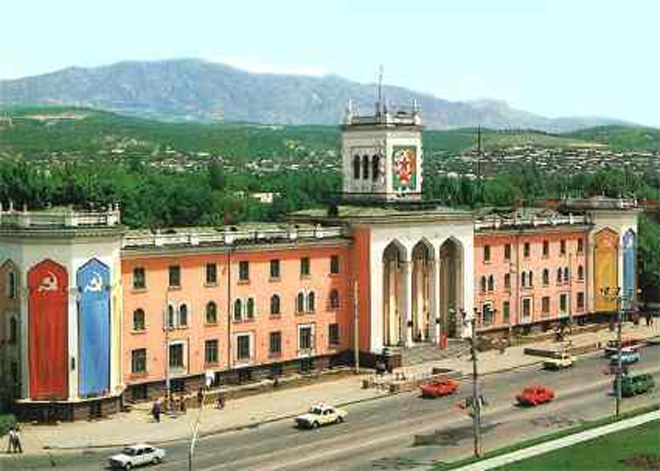Azerbaijan, Baku, June 24 /Trend, V.Zhavoronkova/
The West is interested that Tajikistan would be a strong country capable to contain to contain any threat coming out of Afghanistan, the U.S. expert on Central Asia Bruce Pannier said.
"Western nations need a strong, stable Tajikistan to contain problems in Afghanistan on the Afghan side of the border and that need won't change for years," the expert of Radio Liberty Bruce wrote in an e-mail to Trend.
The NATO Secretary General's Special Representative for the South Caucasus and Central Asia James Appathurai this week made a visit to Tajikistan, where he discussed cooperation of alliance with the country.
The expert said the visit is connected with, first, the participation of the Central Asian countries in supporting NATO operations in Afghanistan and, second, to consult with these governments about what happens as foreign troops in Afghanistan start to depart.
Also according to Pannier, NATO might want to continue to use the airfield near Dushanbe, or the Aini airfield, to continue to support those foreign troops who do stay in Afghanistan after 2014.
Pannier said the West's interest in Tajikistan can be assessed very high, but Tajikistan keeps appearing on lists of countries that are in danger of becoming a "failed state."
"The situation in Tajikistan is not good - the country is poor, there are chronic power shortages, as many as 1 million people are labor migrants in Russia or Kazakhstan, the government is increasingly interfering in religion and the instructing people how to live, that is to say that men can't have beards, women can't have veils, parents are responsible for children who join banned Islamic groups, no children in mosques, no mobile phones in schools, etc.," said Pannier.
There is a real risk that even without problems from Afghanistan spilling over the border Tajikistan could still become unstable, he said.
The alliance provides certain support to Tajikistan: individual members of NATO have been conducting military and security force exercises with Tajik forces for several years now. Also, individual NATO members have supplied equipment - night vision binoculars, uniforms and other non-lethal items - and the U.S. has helped provide better facilities for border posts, the expert said.
Also, Western nations are helping Tajikistan to combat illegal narcotics trafficking out of Afghanistan and such help also should continue for many years to come, Pannier said.
Besides NATO, Russia also displayed interest in cooperation with Tajikistan: Russian Defense Minister Anatoly Serdyukov was scheduled to visit Tajikistan on June 24-25. However, according to preliminary data, the visit was postponed for a week.
But a senior source in the Tajik Defense Ministry told "Interfax" that: "The Russian Defense Minister's visit was not scheduled immediately after the NATO special representative's visit by chance. It was planned to discuss the terms of use of the Aini military airfield by the Russian militaries, but the sides have not reached consensus at the preliminary agreement."
Bruce stressed the importance of bilateral relations between Russia and Tajikistan.
"Tajikistan has always needed Russia since independence. The two countries have strains in relations sometimes but in the end Russia is Tajikistan's best guarantee for security," Pannier said.
He said Russia's 201st Division is based in Tajikistan and is the best equipped and trained fighting force in Central Asia today. According to Pannier, Russia wants to further help Tajikistan strengthen its border with Afghanistan both to keep Islamic militants and narcotics from crossing into Central Asia and going further toward Russia. There have been ongoing negotiations for Russian border guards to return to Tajikistan.
"It may, and I stress "may," be possible that the NATO representative's visit and Serdyukov's visit are part of coordinated help and advice to Tajik officials," he said.
According to Pannier, this is one are where Russia and the West's interests coincide so both want to help Tajikistan to contain any threat coming out of Afghanistan
"I'd look for Russia's role in Tajikistan to become more visible in the coming months and I think NATO would be grateful to know Russia is helping the Tajik government meet its security needs," he underscored.
"Western forces are not planning on totally pulling out any time soon but their number will be greatly reduced," he said. "There is little chance Afghanistan will be stable soon".
"Uzbekistan's very short border (less than 60 kilometers) with Afghanistan is heavily fortified but Tajikistan's mountainous border with Afghanistan has hundreds of small trails that narcotics traffickers and militants can cross and is impossible to seal off entirely," Pannier said.
He said there is a strong possibility that militants will be crossing soon, whether to destabilize Central Asia and the governments that are helping Western forces, or simply to hide and find temporary safety in Tajikistan's remote mountains.
"I think every Central Asian government is afraid of what happens when the West leaves Afghanistan and they are probably correct to be afraid," Pannier stressed.






